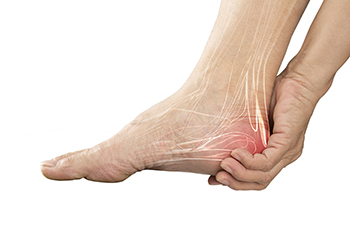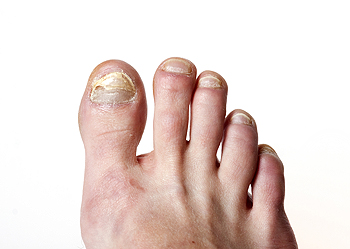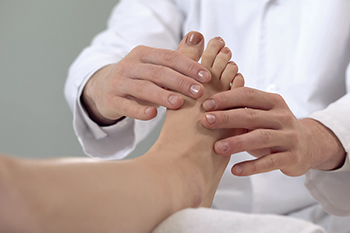Connect With Us
Blog
Items filtered by date: October 2022
Podiatrists in the Military

Podiatrists are foot specialists that work in a variety of practice areas. Many podiatrists, after undergoing a rigorous training regimen, will open up their own practice. Others may work on a team or for another organization like the military. Podiatrists in the military play a very important role. Individuals in the military need healthy, vibrant feet to function well and properly perform their duties. When a serviceman or woman is having an issue with the health of their feet, a military podiatrist will help them identify and treat the problem. Military podiatrists can work in hospitals that are located both on land and also on ships, depending on the specific position. If you are interested in learning more about podiatrists, reach out to your local podiatrist today.
If you are experiencing pain in the feet or ankles, don’t join the stubborn majority refusing treatment. Feel free to contact Afsha Naimat-Shahzad, DPM from Leander Foot & Ankle. Our doctor can provide the care you need to keep you pain-free and on your feet.
What Is a Podiatrist?
Someone would seek the care of a podiatrist if they have suffered a foot injury or have common foot ailments such as heal spurs, bunions, arch problems, deformities, ingrown toenails, corns, foot and ankle problems, etc.
Podiatric Treatment
A podiatrist will treat the problematic areas of the feet, ankle or lower leg by prescribing the following:
- Physical therapy
- Drugs
- Orthotic inserts or soles
- Surgery on lower extremity fractures
A common podiatric procedure a podiatrist will use is a scanner or force plate which will allow the podiatrist to know the designs of orthotics. Patients are then told to follow a series of tasks to complete the treatment. The computer will scan the foot a see which areas show weight distribution and pressure points. The podiatrist will read the analysis and then determine which treatment plans are available.
If you have any questions please feel free to contact our office located in Leander, TX . We offer the newest diagnostic and treatment technologies for all your foot and ankle needs.
It's Time for Beautiful Feet
Heel Pain Can Exist for Various Reasons

There are various reasons why patients can develop heel pain. These can include uncomfortable foot conditions such as plantar fasciitis, heel spurs, or an Achilles tendon injury. Diabetic patients may be prone to developing heel pain, and bursitis may cause this pain to become worse. Mild relief may be found from heel pain by frequently elevating the affected foot, wearing shoes that fit correctly, and performing gentle exercises and stretches. Many patients choose to wear soft insoles in their shoes, in addition to wrapping an elastic bandage around the ankle which may provide extra support. Heel pain is often indicative of an existing medical condition, and it is strongly urged that you contact a podiatrist as quickly as possible who can accurately determine the cause and provide effective treatment options.
Many people suffer from bouts of heel pain. For more information, contact Afsha Naimat-Shahzad, DPM of Leander Foot & Ankle. Our doctor can provide the care you need to keep you pain-free and on your feet.
Causes of Heel Pain
Heel pain is often associated with plantar fasciitis. The plantar fascia is a band of tissues that extends along the bottom of the foot. A rip or tear in this ligament can cause inflammation of the tissue.
Achilles tendonitis is another cause of heel pain. Inflammation of the Achilles tendon will cause pain from fractures and muscle tearing. Lack of flexibility is also another symptom.
Heel spurs are another cause of pain. When the tissues of the plantar fascia undergo a great deal of stress, it can lead to ligament separation from the heel bone, causing heel spurs.
Why Might Heel Pain Occur?
- Wearing ill-fitting shoes
- Wearing non-supportive shoes
- Weight change
- Excessive running
Treatments
Heel pain should be treated as soon as possible for immediate results. Keeping your feet in a stress-free environment will help. If you suffer from Achilles tendonitis or plantar fasciitis, applying ice will reduce the swelling. Stretching before an exercise like running will help the muscles. Using all these tips will help make heel pain a condition of the past.
If you have any questions please contact our office located in Leander, TX . We offer the newest diagnostic and treatment technologies for all your foot and ankle needs.
How is Toenail Fungus Diagnosed?

Onychomycosis, which is the medical name for toenail fungus, can be unsightly. It is a fungus that affects the nail from underneath and can happen frequently from visiting places where it lives and thrives. These can include public swimming pools, locker rooms, and shower room floors. The fungus enters the body through small cracks in the skin and it is suggested to wear appropriate shoes while in these areas. Common symptoms that many patients experience with toenail fungus can include toenails that have become brittle and yellowed, and in severe cases, the nail may fall off. There are certain groups of people who may be prone to developing toenail fungus. These can consist of patients who have diabetes, poor circulation, or who are over sixty-five years of age. If you have symptoms of toenail fungus, it is advised that you visit a podiatrist who can extract a sample of the nail and helps determine a correct diagnosis. This is followed by applying the correct treatment methods which may include prescription medications.
For more information about treatment, contact Afsha Naimat-Shahzad, DPM of Leander Foot & Ankle. Our doctor can provide the care you need to keep you pain-free and on your feet.
Toenail Fungus Treatment
Toenail fungus is a condition that affects many people and can be especially hard to get rid of. Fortunately, there are several methods to go about treating and avoiding it.
Antifungals & Deterrence
Oral antifungal medicine has been shown to be effective in many cases. It is important to consult with a podiatrist to determine the proper regiment for you, or potentially explore other options.
Applying foot powder on the feet and shoes helps keep the feet free of moisture and sweat.
Sandals or open toed shoes – Wearing these will allow air movement and help keep feet dry. They also expose your feet to light, which fungus cannot tolerate. Socks with moisture wicking material also help as well.
If you have any questions please feel free to contact our office located in Leander, TX . We offer the newest diagnostic tools and technology to treat your foot and ankle needs.
Causes of Tarsal Tunnel Syndrome

The tarsal tunnel is a structure within the foot that runs along the ankle bones and protects the posterior tibial nerve. When this nerve becomes squeezed and exposed to pressure, a condition known as tarsal tunnel syndrome (TTS) can develop where the nerve is compressed within a small space. Activities that can cause the tibial nerve to become compressed include spraining one’s ankle because such an injury can sometimes produce swelling around the nerve. Certain types of diseases, like diabetes, can sometimes cause TTS because diabetics can experience swelling of the feet, which may put pressure on the tibial nerve. Additionally, the presence of abnormally sized structures within the tarsal tunnel can also cause TTS. For example, large veins, cysts, bone spurs, or swollen tendons can put pressure on the tibial nerve. If you believe that you have TTS, contact a podiatrist today to schedule an appointment.
Tarsal tunnel syndrome can be very uncomfortable to live with. If you are experiencing tarsal tunnel syndrome, contact Afsha Naimat-Shahzad, DPM of Leander Foot & Ankle. Our doctor can provide the care you need to keep you pain-free and on your feet.
Tarsal Tunnel Syndrome
Tarsal tunnel syndrome, which can also be called tibial nerve dysfunction, is an uncommon condition of misfiring peripheral nerves in the foot. The tibial nerve is the peripheral nerve in the leg responsible for sensation and movement of the foot and calf muscles. In tarsal tunnel syndrome, the tibial nerve is damaged, causing problems with movement and feeling in the foot of the affected leg.
Common Cause of Tarsal Tunnel Syndrome
- Involves pressure or an injury, direct pressure on the tibial nerve for an extended period of time, sometimes caused by other body structures close by or near the knee.
- Diseases that damage nerves, including diabetes, may cause tarsal tunnel syndrome.
- At times, tarsal tunnel syndrome can appear without an obvious cause in some cases.
The Effects of Tarsal Tunnel Syndrome
- Different sensations, an afflicted person may experience pain, tingling, burning or other unusual sensations in the foot of the affected leg.
- The foot muscles, toes and ankle become weaker, and curling your toes or flexing your foot can become difficult.
- If condition worsens, infections and ulcers may develop on the foot that is experiencing the syndrome.
A physical exam of the leg can help identify the presence of tarsal tunnel syndrome. Medical tests, such as a nerve biopsy, are also used to diagnose the condition. Patients may receive physical therapy and prescriptive medication. In extreme cases, some may require surgery.
If you have any questions please feel free to contact our office located in Leander, TX . We offer the newest diagnostic and treatment technologies for all your foot and ankle needs.
Blog Archives
- April 2025
- March 2025
- February 2025
- January 2025
- December 2024
- November 2024
- October 2024
- September 2024
- August 2024
- July 2024
- June 2024
- May 2024
- April 2024
- March 2024
- February 2024
- January 2024
- December 2023
- November 2023
- October 2023
- September 2023
- August 2023
- July 2023
- June 2023
- May 2023
- April 2023
- March 2023
- February 2023
- January 2023
- December 2022
- November 2022
- October 2022
- September 2022
- August 2022


